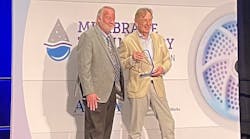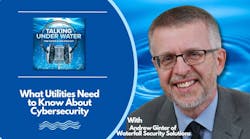NSF Intl. has announced that Premium Waters, Inc. is the first company to receive both NSF Bottled Water Certification and Level 3 Safe Quality Food (SQF) Certification.
The NSF Bottled Water Certification program is a comprehensive program that involves conducting extensive product testing and unannounced bottling facility audits, which encompass every aspect of the operation from water source to the filling room. The NSF audit verifies compliance with Good Manufacturing Practices (GMPs), Hazard Analysis and Critical Control Points (HACCP), Food and Drug Administration (FDA) requirements and Codex Alimentarius guidelines. NSF laboratory professionals perform extensive product testing for more than 160 chemicals, inorganic, radiological and microbiological contaminants.
In addition to obtaining NSF Bottled Water Certification, Premium Waters also received the highest level of SQF certification: Level 3. Recognized under the Global Food Safety Initiative1 (GFSI)-benchmarked standards, SQF is designed to verify a supplier’s food safety and quality management system complies with international and domestic food safety regulations. NSF Intl. is recognized by the SQF Institute as an approved certification body and accredited by the American National Standards Institute (ANSI) to provide SQF certifications.
Premium Waters completed SQF Level 3 certification after implementing “best practices” in comprehensive quality systems, building on the work done in 2008 to reach Level 2. This progression demands integration of food safety and quality, built upon the foundation of HACCP, and continues to underscore Premium Waters’ leadership in food safety and quality management.
The levels of certification include:
Level 1: Food Safety Fundamentals;
Level 2: Certified HACCP Food Safety Plans; and
Level 3: Comprehensive Quality Management Systems Development.
Level 1 and Level 2 certifications are prerequisites to achieving a Level 3 SQF certificate. All of Premium Waters plants have received SQF certification, including: Kansas City, Kan.; Fort Worth, TX; Chippewa Falls, Wis.; Quincy, Ill.; Greeneville, Ten,.; and Douglas, Ga. These plants were all certified in the fourth quarter of 2008.
“Investing in food safety and quality assurance is essential,” said Greg Nemec, Premium Waters president. “Consumers want peace of mind that the products they purchase have met the proper quality and safety requirements and obtaining SQF Level 3 certification, in addition to NSF bottled water certification helps verify this process.”
In order to receive SQF certification, Premium Waters’ plants were audited by NSF Intl. to verify that their products have been produced, processed, prepared and handled according to internationally-recognized SQF requirements. This process helps to minimize food safety risks by incorporating GMPs, HACCP, training, traceability and a quality and safety management system that verifies ongoing compliance.
“Premium Waters has achieved a major milestone by combining the certification of their management systems (SQF) with the certification of their bottled water product line. This combination assures customers and retailers that every aspect of beverage quality has been addressed to ensure confidence in the products sold,” said Chris Dunn, general manager of NSF’s Bottled Water/Beverage Certification Program.
Source: NSF International

